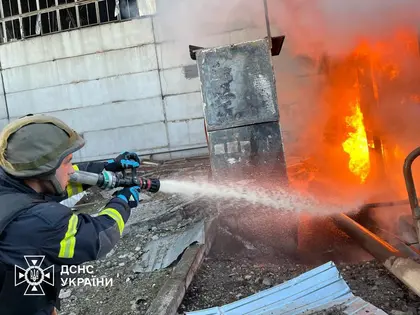Russian forces launched yet another mass aerial attack against Ukraine on Thursday morning, April 11, firing missiles, including hypersonic Kinzhals, from more than nine strategic bombers, targeting critical infrastructures in the Kyiv, Zaporizhzhia, Lviv and Kharkiv regions.
Russia has recently stepped up its aerial assaults on Ukraine in recent weeks, targeting energy infrastructure.
JOIN US ON TELEGRAM
Follow our coverage of the war on the @Kyivpost_official.
As a result of the attack, the Trypillya Thermal Power Plant (TPP) was completely destroyed in the Kyiv region,
Andriy Gota, the head of the Supervisory Board of "Centrenergo", confirmed that all employees who were on shift during the shelling remained unharmed.
However, rocket strikes caused a large-scale fire to erupt in the turbine shop. The company is currently taking active measures to extinguish the fire.
Earlier, in early March of this year, the Zmiyivska TPP in the Kharkiv region was also completely destroyed. Additionally, in July 2022, Russian troops occupied the Uglegorska TPP in the Donetsk region.
These events have resulted in PJSC Centrenergo losing all electricity generation capacity.
Ukraine's largest energy company, DTEK, stated that the attack caused serious damage to the equipment of two thermal power plants.
Ukrenergo reported that as a result of the attack, electrical substations and generation facilities in the listed regions, as well as in the Odessa region, were damaged.

N. Korean Troops Massed in Russia to Enter Ukraine War ’Soon’: Pentagon Chief
In the Kharkiv region, the supply of electricity is limited, while in other regions, it was not necessary to resort to this measure.
According to Oleksiy Kuleba, the deputy head of the office of the President of Ukraine, about 200,000 local residents were left without electricity in Kharkiv and the surrounding region due to the attack.
An air alarm kicked off across the country at around 4 a.m., with the Ukrainian Air Force urging citizens to immediately proceed to shelters.
“Missiles come from Chernihiv region, South-West Course,” – the Air Force wrote on the Telegram messaging app.
According to Ukraine's Air Force report following the attack, a total of 82 drones and missiles were utilized by the Russian troops.
- 20 X-101/X-555 cruise missiles were deployed from TU-95 Ms strategic aviation aircraft, originating from the Saratov region in the Russian Federation.
- 6 X-47M2 Kinzhal hypersonic missiles were launched from MiG-31K fighters, with their launch site located in the Tambov region of Russia.
- 12 S-300 anti-aircraft guided missiles were fired from the Belgorod region in Russia.
- 40 Shahed-131/136 attack UAVs were dispatched from regions including Primorsko-Akhtarsk in the Russian Federation and Chauda in Crimea.
- 4 X-59 guided aviation missiles were launched from the airspace of the occupied Zaporizhia region.
Ukraine's Air Defence managed to intercept and shot down 57 targets, comprising 18 missiles and 39 Shahed drones.
At the end of March, Russian forces had fired 99 drones and missiles at Ukraine in a barrage that damaged at least three power stations.
The Ukrainian Interior Ministry said the Russian assault had targeted 10 regions of the country, damaging power stations and private homes, and wounding several people.
Drones and missiles targeted thermal and hydroelectric power plants across the country, resulting in several cities losing electricity, emergency schedules being implemented, and reports of injuries.
One of the country’s main energy providers, DTEK, said three of its thermal power stations had been attacked in the barrage, leaving facilities “severely damaged,” without elaborating.
A week earlier, on March 22, Russia launched its largest aerial assault in months, targeting energy facilities across Ukraine and resulting in at least five fatalities.
You can also highlight the text and press Ctrl + Enter









